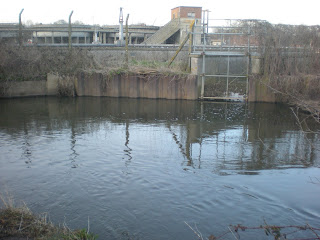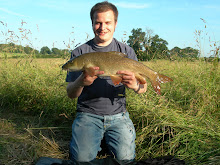 A TRIP to a new stretch of river threw up some interesting results today and has seriously whetted my appetite for a return visit.
A TRIP to a new stretch of river threw up some interesting results today and has seriously whetted my appetite for a return visit. I recced this particular bit of Blackwater that offers free fishing a few weeks ago and returned today armed with rod, rucksack and stool for a bit of roving in search, yet again, of a chub.
A likely looking overhanging tree on the far bank saw my cheese paste flicked in its direction and before it hit the deck, my 3oz tip sprang into life and my target species was on.
Bear in mind that this was my first cast on a new stretch of river – I couldn't believe what was happening. A short but spirited fight and a difficult netting in the strong current ended in a chub of about a pound-and-a-half on my unhooking mat.
I slipped the fish back to its watery home and my confidence went through the roof. Could this be the dream small river swim from which I could plunder a bag of chub?
Well... no. The following bite-less hour saw the realisation dawn on me that I'd been lucky enough to hit the only chub in my swim smack-bang on the head with a stinking lump of high-vis paste, a situation that ended in the only plausible outcome but one that was not to be repeated.
With all the other likely looking swims being used or better suited to a float, my dad and I quickly stowed our kit and headed off with the intention of driving to our normal stretch of the same river about a mile down the road.
Reaching a swim that had been occupied when we arrived, I spotted a float attached to a tree within reach of a landing net. So with a precarious lean out over the river, I got the net round it and it slipped off the line to become the latest addition to my float collection.
Buoyed by this success and pleased with my new crystal loafer, I wandered off after a stick float I remembered having seen earlier dangling from another tree, leaving my dad and the kit in the picturesque peg opposite a sewage works.
I returned later empty handed to find my dad having a cheeky cast in the swim you can see in the picture above. He'd taken the feeder off his line to carry the rod and as a result was effectively free-lining a lump of paste in the far side slack water before it was gradually dragged round into the main flow. He assured me this method had resulted in “a huge hit” just moments before I'd returned from my float hunt.
Thoughts of the other stretch of river started to fade as the paste was re-cast for another trundle through the swim, this time starting in the outflow of clean water from the works.
Very quickly, a couple of tweaks on the tip signalled some piscatorial intention and the next thing I knew, my dad was leaning into a fish as his John Wilson Avon rod took on a very healthy curve.
A chub approximately two-and-a-half times the size of my earlier effort soon graced the net and we realised that this swim if not exactly pretty, certainly had some serious potential to produce fish.
With my rod broken down for the car, I was handed the 'John Wilson' and was graciously allowed a chuck in the new killer swim. It didn't take long for a bite to register and I struck into lump that was determined not to be dragged up from the depths. From the way it stayed deep, boring around and around, I started to hope I was attached to a new river record.
But the surface was broken suddenly and violently and my hopes were dashed as the distinctive markings of a pike became all too clear.
It was a good fight however, and somehow the mono hook link held firm. A jack of just over five pounds was safely returned to continue harassing my intended quarry and as the daylight faded, we headed for home leaving the swim we've dubbed 'the aquarium' to recover in anticipation of our next visit.









